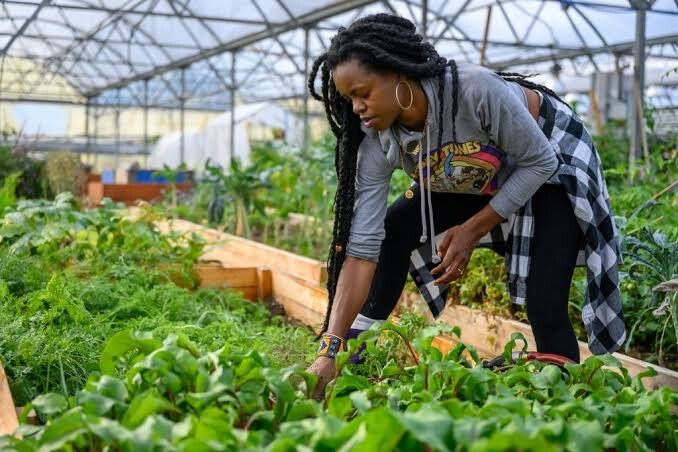Ten years ago, if you asked Nana Adjoa Sifa Amponsah what power looked like, she probably wouldn’t have pointed to a farm.
Today, she absolutely would.
Under the quiet sun of Ghana’s Eastern Region, you won’t hear speeches. You’ll hear tools scraping soil, harvest sacks being filled, and women laughing in languages the West has never tried to learn. These women once called “helpers,” now called “agripreneurs” are transforming what it means to grow in Africa. And not just food. They’re growing identity, income, influence.
This is not a quiet movement. It’s deliberate. It’s fierce. And it’s deeply African.
Through Guzakuza, the social enterprise Nana founded, thousands of women across the continent are being trained to not only cultivate crops but to build businesses, command respect, and rethink the way land is linked to legacy. These aren’t passive beneficiaries. They’re leaders, strategists, and decision-makers, many of them running what were once inherited subsistence farms like real companies.
But here’s what’s most powerful: it’s not just about farming better. It’s about seeing land differently.
Ama, a 33-year-old participant from northern Ghana, remembers being told as a child, “Farming is for the tired, the trapped, or the poor.” Today, she runs a processing business for dried cassava, selling across regions. Her twin daughters now say they want to “own land and feed nations.” What shifted? Visibility. Mentorship. A woman like her who told her: “Your field is not your limit. It’s your starting point.”
Today, she absolutely would.
Under the quiet sun of Ghana’s Eastern Region, you won’t hear speeches. You’ll hear tools scraping soil, harvest sacks being filled, and women laughing in languages the West has never tried to learn. These women once called “helpers,” now called “agripreneurs” are transforming what it means to grow in Africa. And not just food. They’re growing identity, income, influence.
This is not a quiet movement. It’s deliberate. It’s fierce. And it’s deeply African.
Through Guzakuza, the social enterprise Nana founded, thousands of women across the continent are being trained to not only cultivate crops but to build businesses, command respect, and rethink the way land is linked to legacy. These aren’t passive beneficiaries. They’re leaders, strategists, and decision-makers, many of them running what were once inherited subsistence farms like real companies.
But here’s what’s most powerful: it’s not just about farming better. It’s about seeing land differently.
Ama, a 33-year-old participant from northern Ghana, remembers being told as a child, “Farming is for the tired, the trapped, or the poor.” Today, she runs a processing business for dried cassava, selling across regions. Her twin daughters now say they want to “own land and feed nations.” What shifted? Visibility. Mentorship. A woman like her who told her: “Your field is not your limit. It’s your starting point.”

And that’s the quiet genius of this movement. It’s not built in conference halls. It’s built in rows of okra, in WhatsApp groups where women share fertilizer tips and price negotiations, and in roadside stalls turned branded distribution chains.
In much of African history, land has been tangled with shame and silence especially for women. Ownership was rare. Voice was rarer. But something sacred is happening now: women are not just asking for land. They’re defending it. They’re working it, naming it, and shaping its future.
Guzakuza’s Ignite Fellowship isn’t simply teaching women to grow crops; it’s reframing farming as strategy. From agro-finance basics to digital marketing and value chain access, these women are learning to scale—not just survive. And they are doing it while raising families, managing households, and leading change in communities where tradition often asks them to stay small.
But they are not staying small.
And the beauty is: this movement isn’t limited to Ghana. Through virtual learning, peer coaching, and culturally rooted storytelling, African women from Kenya, Nigeria, Rwanda, and Uganda are sharing successes and failures in real time. They’re challenging gender roles, reclaiming ancestral knowledge, and rewriting what it means to work the land with dignity.
So, when people ask, “What’s happening in African agriculture?” maybe the better question is: Who’s happening?
The answer? Women.
The response? Legacy.
The result? A continent feeding itself from the ground up with the hands, hearts, and vision of its daughters.
And the next time Nana Adjoa is asked what power looks like, she might just hand you a tomato. A perfect, ripe, locally grown Ghanaian tomato cultivated not by chance, but by choice.
In much of African history, land has been tangled with shame and silence especially for women. Ownership was rare. Voice was rarer. But something sacred is happening now: women are not just asking for land. They’re defending it. They’re working it, naming it, and shaping its future.
Guzakuza’s Ignite Fellowship isn’t simply teaching women to grow crops; it’s reframing farming as strategy. From agro-finance basics to digital marketing and value chain access, these women are learning to scale—not just survive. And they are doing it while raising families, managing households, and leading change in communities where tradition often asks them to stay small.
But they are not staying small.
And the beauty is: this movement isn’t limited to Ghana. Through virtual learning, peer coaching, and culturally rooted storytelling, African women from Kenya, Nigeria, Rwanda, and Uganda are sharing successes and failures in real time. They’re challenging gender roles, reclaiming ancestral knowledge, and rewriting what it means to work the land with dignity.
So, when people ask, “What’s happening in African agriculture?” maybe the better question is: Who’s happening?
The answer? Women.
The response? Legacy.
The result? A continent feeding itself from the ground up with the hands, hearts, and vision of its daughters.
And the next time Nana Adjoa is asked what power looks like, she might just hand you a tomato. A perfect, ripe, locally grown Ghanaian tomato cultivated not by chance, but by choice.

